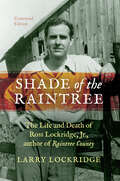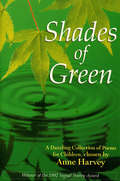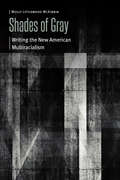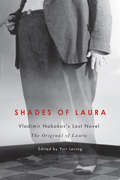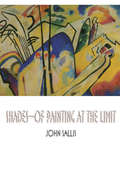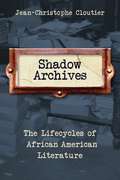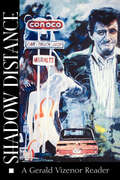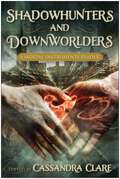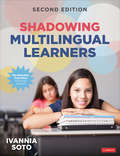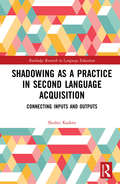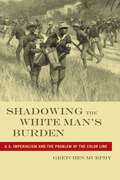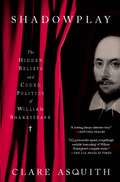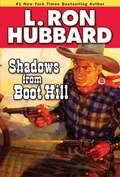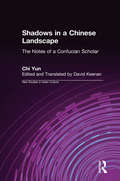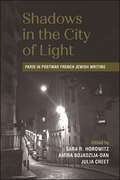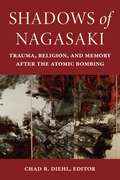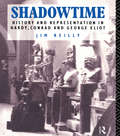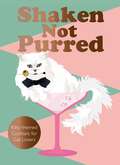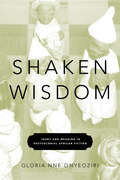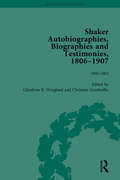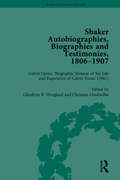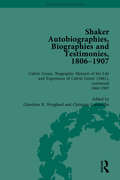- Table View
- List View
Shade of the Raintree, Centennial Edition: The Life And Death Of Ross Lockridge, Jr. , Author Of Raintree County
by Larry LockridgeRaintree County, the first novel by Ross Lockridge, Jr., was the publishing event of 1948. Excerpted in Life magazine, it was a Book-of-the-Month Club Main Selection, won MGM's Novel Award and a movie deal, and stood at the top of the nation's bestseller lists. Unfortunately, Lockridge's first novel was also his last. Two months after its publication the 33-year-old author from Bloomington, Indiana, took his own life. His son Larry was five years old at the time. Shade of the Raintree is Larry's search for an understanding of his father's baffling act. In this powerfully narrated biography, Larry Lockridge uncovers a man of great vitality, humor, love, and visionary ambition, but also of deep vulnerability. The author manages to combine a son's emotional investments with a sleuth's dispassionate inquiry. The result is an exhilarating, revelatory narrative of an American writer's life. With a new preface by the author, this 2014 paperback edition marks 100 years since the birth of Ross Lockridge, Jr.
Shades Of Green
by Anne HarveyA wide-ranging collection of nature poems for children, chosen by Anne Harvey. This is the perfect collection for introducing children to the magic of poetry. Includes poems from Thomas Hardy, Spike Milligan, Laurie Lee, Ian Serraillier, John Betjemen, William Blake, Geoffery Chaucer, Emily Dickinson, Philip Larkin, Helen Dunmore, and many more.
Shades of Gray: Writing the New American Multiracialism (Borderlands and Transcultural Studies)
by Molly Littlewood McKibbinIn Shades of Gray Molly Littlewood McKibbin offers a social and literary history of multiracialism in the twentieth-century United States. She examines the African American and white racial binary in contemporary multiracial literature to reveal the tensions and struggles of multiracialism in American life through individual consciousness, social perceptions, societal expectations, and subjective struggles with multiracial identity. McKibbin weaves a rich sociohistorical tapestry around the critically acclaimed works of Danzy Senna, Caucasia (1998); Rebecca Walker, Black White and Jewish: Autobiography of a Shifting Self (2001); Emily Raboteau, The Professor’s Daughter (2005); Rachel M. Harper, Brass Ankle Blues (2006); and Heidi Durrow, The Girl Who Fell from the Sky (2010). Taking into account the social history of racial classification and the literary history of depicting mixed race, she argues that these writers are producing new representations of multiracial identity.Shades of Gray examines the current opportunity to define racial identity after the civil rights, black power, and multiracial movements of the late twentieth century changed the sociopolitical climate of the United States and helped revolutionize the racial consciousness of the nation. McKibbin makes the case that twenty-first-century literature is able to represent multiracial identities for the first time in ways that do not adhere to the dichotomous conceptions of race that have, until now, determined how racial identities could be expressed in the United States.
Shades of Laura
by Yuri LevingShortly before Vladimir Nabokov died in 1977, he left instructions that the draft for his last novel, The Original of Laura, be destroyed. But in 2008 Dmitri Nabokov, the writer's only child and sole surviving heir, contravened his father's wishes. Formed from novelistic fragments that had been hidden from the public eye for three decades, The Original of Laura is a construction based on the conjecture of the Nabokov estate, publishers, and scholars. Shades of Laura returns to the "scene of the crime," elucidating the process of publishing Nabokov's unfinished novel from its conception - the reproduction of 138 handwritten index cards - to the simultaneous publication of translations of the final text in several languages. The essays in this collection investigate the event of publication and reconstitute the book's critical reception, reproducing a selection of some of the most salient reviews. Critics condemned Dmitri's choice, but as contributors to this volume attest, there are many more "shades" and "nuances" to his decision. The book also endeavours to allow readers to understand and evaluate an incomplete novel; contributors analyze its plot, structure, imagery, and motifs. Published after prolonged public debate, Vladimir Nabokov's The Original of Laura was dubbed "the most eagerly awaited literary novel of this fledgling century." Covering the publication from a broad spectrum of perspectives, this collection reassesses the Nabokov canon and the roots of his literary prestige. Contributors include Paul Ardoin (Florida State University), Gennady Barabtarlo (University of Missouri), Brian Boyd (University of Auckland), Marijeta Bozovic (Colgate University), Maurice Couturier (University of Nice), Lara Delage-Toriel (Strasbourg University), Galya Diment (University of Washington), Leland de la Durantaye (Claremont McKenna College), Michael Juliar (Private collector), Eric Naiman (University of California, Berkeley), Ellen Pifer (University of Delaware), Anna Raffetto (Giulio Einaudi Publishing House, Turin), Michael Rodgers (University of Strathclyde), Rien Verhoef (Leiden University), Olga Voronina (Bard College), Tadashi Wakashima (Kyoto University), Michael Wood (Princeton University), and Barbara Wyllie (Slavonic and East European Review).
Shades of Laura: Vladimir Nabokov's Last Novel, The Original of Laura
by Yuri LevingShortly before Vladimir Nabokov died in 1977, he left instructions that the draft for his last novel, The Original of Laura, be destroyed. But in 2008 Dmitri Nabokov, the writer's only child and sole surviving heir, contravened his father's wishes. Formed from novelistic fragments that had been hidden from the public eye for three decades, The Original of Laura is a construction based on the conjecture of the Nabokov estate, publishers, and scholars. Shades of Laura returns to the "scene of the crime," elucidating the process of publishing Nabokov's unfinished novel from its conception - the reproduction of 138 handwritten index cards - to the simultaneous publication of translations of the final text in several languages. The essays in this collection investigate the event of publication and reconstitute the book's critical reception, reproducing a selection of some of the most salient reviews. Critics condemned Dmitri's choice, but as contributors to this volume attest, there are many more "shades" and "nuances" to his decision. The book also endeavours to allow readers to understand and evaluate an incomplete novel; contributors analyze its plot, structure, imagery, and motifs. Published after prolonged public debate, Vladimir Nabokov's The Original of Laura was dubbed "the most eagerly awaited literary novel of this fledgling century." Covering the publication from a broad spectrum of perspectives, this collection reassesses the Nabokov canon and the roots of his literary prestige. Contributors include Paul Ardoin (Florida State University), Gennady Barabtarlo (University of Missouri), Brian Boyd (University of Auckland), Marijeta Bozovic (Colgate University), Maurice Couturier (University of Nice), Lara Delage-Toriel (Strasbourg University), Galya Diment (University of Washington), Leland de la Durantaye (Claremont McKenna College), Michael Juliar (Private collector), Eric Naiman (University of California, Berkeley), Ellen Pifer (University of Delaware), Anna Raffetto (Adelphi Publishing House, Milan), Michael Rodgers (University of Strathclyde), Rien Verhoef (Leiden University), Olga Voronina (Bard College), Tadashi Wakashima (Kyoto University), Michael Wood (Princeton University), and Barbara Wyllie (Slavonic and East European Review).
Shades—Of Painting at the Limit
by John Sallis"[Sallis’s] ideas are presented in a singular, scholarly, remarkable, captivating, conceptually rigorous, dense, and deep manner.... Highly recommended." —Choice"This fascinating book by one of the more original voices writing philosophy in English poses questions about the nature of the visible and invisible, sensible and intelligible." —Dennis SchmidtWhat is it that an artist paints in a painting? Working from paintings themselves rather than from philosophical theories, John Sallis shows how, through shades and limits, the painter renders visible the light that confers visibility on things. In his extended examination of three phases in the development of modern painting, Sallis focuses on the work of Claude Monet, Wassily Kandinsky, and Mimmo Paladino—three painters who, each in his own way, carry painting to the limit.
Shadow Archives: The Lifecycles of African American Literature
by Jean-Christophe CloutierRecasting the history of African American literature, Shadow Archives brings to life a slew of newly discovered texts—including Claude McKay’s Amiable with Big Teeth—to tell the stories of black special collections and their struggle for institutional recognition. Jean-Christophe Cloutier offers revelatory readings of major African American writers, including McKay, Richard Wright, Ann Petry, and Ralph Ellison, and provides a nuanced view of how archival methodology, access, and the power dynamics of acquisitions shape literary history.Shadow Archives argues that the notion of the archive is crucial to our understanding of postwar African American literary history. Cloutier combines his own experiences as a researcher and archivist with a theoretically rich account of the archive to offer a pioneering study of the importance of African American authors’ archival practices and how these shaped their writing. Given the lack of institutions dedicated to the black experience, the novel became an alternative site of historical preservation, a means to ensure both individual legacy and group survival. Such archivism manifests in the work of these authors through evolving lifecycles where documents undergo repurposing, revision, insertion, falsification, transformation, and fictionalization, sometimes across decades. An innovative interdisciplinary consideration of literary papers, Shadow Archives proposes new ways for literary scholars to engage with the archive.
Shadow Distance: A Gerald Vizenor Reader
by Gerald VizenorA wide-ranging collection of fiction, essays, poetry and more by the acclaimed Native American author of Bearheart and Interior Landscapes.Gerald Vizenor is one of our era’s most important and prolific Native American writers. Drawing on the best work of an acclaimed career, Shadow Distance: A Gerald Vizenor Reader reveals the wide range of his imagination and the evolution of his central themes.This compelling collection includes not only selections from Vizenor’s innovative fiction, but also poetry, autobiography, essays, journalism, and the previously unpublished screenplay “Harold of Orange,” winner of the Film-in-the-Cities national screenwriting competition.Whether focusing on Native American tricksters or legal and financial claims of tribal sovereignty, Vizenor continually underscores the diversities of modern traditions, the mixed ethnicity that characterizes those who claim Native American origin, and cultural permeability of an increasingly commercial, global world.
Shadowhunters and Downworlders: A Mortal Instruments Reader
by Holly Black Sarah Rees BrennanExplore the world of the Mortal Instruments with Cassandra Clare and more Join Cassandra Clare and a Circle of more than a dozen top YA writers, including New York Times bestsellers Holly Black, Rachel Caine, and Kami Garcia, as they write about the Mortal Instruments series, its characters, and its world. Inside you'll read: A cinematic tutorial on why the best friend (Simon) always loses out to the bad boy (Jace) The unexpected benefits of the incest taboo What we can read between the lines of Alec and Magnus' European vacation The importance of friendship, art, humor, and rebellion And more, from the virtues of Downworlders to the naughty side of Shadowhunting
Shadowing Multilingual Learners
by Ivannia SotoWalk in your Students’ Shoes with Multilingual Learner Shadowing The need for powerful professional learning to enable Multilingual Learners reach their full potential is more profound than ever. MLL shadowing is a way to create urgency around the instructional and academic needs of Multilingual Learners. The MLL Shadowing protocol is used to collect data on MLL’s opportunities for speaking and listening--the building blocks for reading and writing--in our classrooms. Updated after 10 years of research and practice, the second edition of this bestselling resource includes an overview on the importance of oral language development, information on preparing the shadowing experience, the complete shadowing protocol, a guide for analyzing the shadowing experience and key oral language development strategies. The new edition also adds improved data collection for oral language expression, as well as highlights updated research and classroom practice concerning new policies and programs implemented across the country. A comprehensive guide to ELL shadowing is presented alongside: Detailed case studies showing real-world examples Guidelines for analyzing and reflecting on the shadowing experience Guidelines for shadowing in a virtual environment Guidelines for shadowing in a multilingual environment An assets-based orientation to student learning and the use of achievement data to improve ELL education This book provides an entry point for broader, systemic improvement that will serve ELLs in more varied instructional settings, including monolingual and bilingual programs.
Shadowing Multilingual Learners
by Ivannia SotoWalk in your Students’ Shoes with Multilingual Learner Shadowing The need for powerful professional learning to enable Multilingual Learners reach their full potential is more profound than ever. MLL shadowing is a way to create urgency around the instructional and academic needs of Multilingual Learners. The MLL Shadowing protocol is used to collect data on MLL’s opportunities for speaking and listening--the building blocks for reading and writing--in our classrooms. Updated after 10 years of research and practice, the second edition of this bestselling resource includes an overview on the importance of oral language development, information on preparing the shadowing experience, the complete shadowing protocol, a guide for analyzing the shadowing experience and key oral language development strategies. The new edition also adds improved data collection for oral language expression, as well as highlights updated research and classroom practice concerning new policies and programs implemented across the country. A comprehensive guide to ELL shadowing is presented alongside: Detailed case studies showing real-world examples Guidelines for analyzing and reflecting on the shadowing experience Guidelines for shadowing in a virtual environment Guidelines for shadowing in a multilingual environment An assets-based orientation to student learning and the use of achievement data to improve ELL education This book provides an entry point for broader, systemic improvement that will serve ELLs in more varied instructional settings, including monolingual and bilingual programs.
Shadowing as a Practice in Second Language Acquisition: Connecting Inputs and Outputs (Routledge Research in Language Education)
by Shuhei KadotaShadowing is a theoretically and empirically well-examined method to develop L2 learners’ listening comprehension (input effect); enhance their subvocal rehearsal mechanism in the phonological working memory for learning new words, formula, and constructions (practice effect); simulate some stages of speech production (output effect); and develop metacognitive monitoring and control by their executive working memory (monitoring effect). In Japan and some other Asian countries, shadowing is a well-recognized, popular method of learning English and Japanese as L2, and this book offers the chance for anyone new to this method to benefit. Through the research contained within this book, readers will be armed with detailed and useful accounts of the four effects above (i.e. input, practice, output, and monitoring effects) from a theoretical and empirical viewpoint.
Shadowing the White Man’s Burden: U.S. Imperialism and the Problem of the Color Line (America and the Long 19th Century #24)
by Gretchen MurphyDuring the height of 19th century imperialism, Rudyard Kipling published his famous poem “The White Man’s Burden.” While some of his American readers argued that the poem served as justification for imperialist practices, others saw Kipling’s satirical talents at work and read it as condemnation. Gretchen Murphy explores this tension embedded in the notion of the white man’s burden to create a new historical frame for understanding race and literature in America.Shadowing the White Man’s Burden maintains that literature symptomized and channeled anxiety about the racial components of the U.S. world mission, while also providing a potentially powerful medium for multiethnic authors interested in redrawing global color lines. Through a range of archival materials from literary reviews to diplomatic records to ethnological treatises, Murphy identifies a common theme in the writings of African-, Asian- and Native-American authors who exploited anxiety about race and national identity through narratives about a multiracial U.S. empire. Shadowing the White Man’s Burden situates American literature in the context of broader race relations, and provides a compelling analysis of the way in which literature came to define and shape racial attitudes for the next century.
Shadowplay
by Clare AsquithIn 16th century England many loyal subjects to the crown were asked to make a terrible choice: to follow their monarch or their God. The era was one of unprecedented authoritarianism: England, it seemed, had become a police state, fearful of threats from abroad and plotters at home. This age of terror was also the era of the greatest creative genius the world has ever known: William Shakespeare. How, then, could such a remarkable man born into such violently volatile times apparently make no comment about the state of England in his work? He did. But it was hidden. Revealing Shakespeare's sophisticated version of a forgotten code developed by 16th-century dissidents, Clare Asquith shows how he was both a genius for all time and utterly a creature of his own era: a writer who was supported by dissident Catholic aristocrats, who agonized about the fate of England's spiritual and political life and who used the stage to attack and expose a regime which he believed had seized illegal control of the country he loved. Shakespeare's plays offer an acute insight into the politics and personalities of his era. And Clare Asquith's decoding of them offers answers to several mysteries surrounding Shakespeare's own life, including most notably why he stopped writing while still at the height of his powers. An utterly compelling combination of literary detection and political revelation, Shadowplay is the definitive expose of how Shakespeare lived through and understood the agonies of his time, and what he had to say about them.
Shadows from Boot Hill
by L. Ron HubbardSaddle up for excitement with these riveting tales. The outlaw Brazos has skipped town before collecting his blood money for killing a local banker. With the law hot on his tail, he escapes to Los Hornos and his "friend" Whisper Monahan. 'Course, the last time they parted ways, they weren't exactly on good terms, but Brazos don't got much of a choice neither.Whisper greets Brazos with orders to kill a local fella named Scotty Brant that has poisoned over 4,000 acres of his land by sitting on the headwaters of a rare stream using cyanide to extract gold from oxide ore. But this time, Brazos bites off Back more than he can chew when he learns Brandt's hitched up with a witch doctor! And things get right spooky when Brazos picks up another shadow after slaying the witch doctor, who, with his last breath, swears a deadly curse on his soul. ALSO INCLUDES THE WESTERN STORIES "THE GUNNER FROM GEHENNA" AND "GUNMAN""...One of the distinctions Hubbard held was the ability to find new approaches to the well known material of gunslinger heroes and villains...." --Midwest Book Review
Shadows in a Chinese Landscape: Chi Yun's Notes from a Hut for Examining the Subtle
by Chi Yun David KeenanIn this major undertaking David Keenan translates and contextualizes over 100 tales from the Notes from the Hut for Examining the Subtle, a collection of 1,200 tales and observations by Chi Yun, one of eighteenth century China's leading intellectuals. By illuminating neglected aspects of the interaction between popular and elite cultures in late imperial China, this study portrays the rich connection between life and letters on the eve of the Western impact.
Shadows in the City of Light: Paris in Postwar French Jewish Writing (SUNY series in Contemporary Jewish Literature and Culture)
by Sara R. Horowitz; Amira Bojadzija-Dan; Julia CreetThe essays in Shadows in the City of Light explore the significance of Paris in the writing of five influential French writers—Sarah Kofman, Patrick Modiano, George Perec, Henri Raczymow, and Irene Nemirovsky—whose novels and memoirs capture and probe the absences of deported Paris Jews. These writers move their readers through wartime and postwar cityscapes of Paris, walking them through streets and arrondissments where Jews once resided, looking for traces of the disappeared. The city functions as more than a backdrop or setting. Its streets and buildings and monuments remind us of the exhilarating promise of the French Revolution and what it meant for Jews dreaming of equality. But the dynamic space of Paris also reminds us of the Holocaust and its aftermath. The shadowed paths traced by these writers raise complicated questions about ambivalence, absence, memory, secularity, and citizenship. In their writing, the urban landscape itself bears witness to the absent Jews, and what happened to them.For the writers treated in this volume, neither their Frenchness nor their Jewishness is a fixed point. Focusing on Paris's dual role as both a cultural hub and a powerful symbol of hope and conflict in Jewish memory, the contributors address intersections and departures among these writers. Their complexity of thought, artistry, and depth of vision shape a new understanding of the impact of the Holocaust on Jewish and French identity, on literature and literary forms, and on the development of Jewish secular culture in Western Europe.
Shadows of Nagasaki: Trauma, Religion, and Memory after the Atomic Bombing (World War II: The Global, Human, and Ethical Dimension)
by Chad R. DiehlA critical introduction to how the Nagasaki atomic bombing has been remembered, especially in contrast to that of Hiroshima.In the decades following the atomic bombing of Nagasaki on August 9, 1945, the city’s residents processed their trauma and formed narratives of the destruction and reconstruction in ways that reflected their regional history and social makeup. In doing so, they created a multi-layered urban identity as an atomic-bombed city that differed markedly from Hiroshima’s image. Shadows of Nagasaki traces how Nagasaki’s trauma, history, and memory of the bombing manifested through some of the city’s many post-atomic memoryscapes, such as literature, religious discourse, art, historical landmarks, commemorative spaces, and architecture. In addition, the book pays particular attention to how the city’s history of international culture, exemplified best perhaps by the region’s Christian (especially Catholic) past, informed its response to the atomic trauma and shaped its postwar urban identity. Key historical actors in the volume’s chapters include writers, Japanese- Catholic leaders, atomic-bombing survivors (known as hibakusha), municipal officials, American occupation personnel, peace activists, artists, and architects. The story of how these diverse groups of people processed and participated in the discourse surrounding the legacies of Nagasaki’s bombing shows how regional history, culture, and politics—rather than national ones—become the most influential factors shaping narratives of destruction and reconstruction after mass trauma. In turn, and especially in the case of urban destruction, new identities emerge and old ones are rekindled, not to serve national politics or social interests but to bolster narratives that reflect local circumstances.
Shadowtime: History and Representation in Hardy, Conrad and George Eliot
by Jim ReillyIn Shadowtime Jim Reilly explores how the great Victorian and Edwardian works of literature can be read in the light of current radical historiography, which foresees the extinction not just of art but of history itself. This is an outstanding combination of original readings and critical survey. Shadowtime is ideal material for anyone studying nineteenth-century realism, modernism and the history of aesthetics.
Shaken Not Purred: Kitty-themed Cocktails for Cat Lovers
by Jay CatsbyFrom the ancient Egyptian hieroglyphs to the modern Grumpy Cat meme, 51% of the population have been obsessing over cats for centuries. And what better way to celebrate our feline overlords than with a fancy tipple in hand as they purr on your lap? Every cocktail here is infused with a love of moggies, from the timeless Old Furrshioned to the fruity Bengal Bramble and the refreshing Pawsco Sour. Each recipe has step-by-step instructions for mixing and garnishing, accompanied by adorable and amusing cat illustrations to gaze at as you prepare your drink.In this book you'll find over 60 delicious cocktails which range from variations on the classics to new and unusual recipes based on your favourite cat breeds. To enjoy alongside your beverage, there are ideas for moggy-themed games, famous kitty trivia, insights into different breeds, and more cat-centric information than you can shake a laser pointer at.Whether you're hosting your cat's birthday party or just want to enjoy a quiet meow-tini at home, this book is a must-have for any cat-loving cocktail enthusiast.
Shaken Not Purred: Kitty-themed Cocktails for Cat Lovers
by Jay CatsbyFrom the ancient Egyptian hieroglyphs to the modern Grumpy Cat meme, 51% of the population have been obsessing over cats for centuries. And what better way to celebrate our feline overlords than with a fancy tipple in hand as they purr on your lap? Every cocktail here is infused with a love of moggies, from the timeless Old Furrshioned to the fruity Bengal Bramble and the refreshing Pawsco Sour. Each recipe has step-by-step instructions for mixing and garnishing, accompanied by adorable and amusing cat illustrations to gaze at as you prepare your drink.In this book you'll find over 60 delicious cocktails which range from variations on the classics to new and unusual recipes based on your favourite cat breeds. To enjoy alongside your beverage, there are ideas for moggy-themed games, famous kitty trivia, insights into different breeds, and more cat-centric information than you can shake a laser pointer at.Whether you're hosting your cat's birthday party or just want to enjoy a quiet meow-tini at home, this book is a must-have for any cat-loving cocktail enthusiast.
Shaken Wisdom: Irony and Meaning in Postcolonial African Fiction
by Gloria Nne OnyeoziriIn her focus on irony and meaning in postcolonial African fiction, Gloria Nne Onyeoziri refers to an internal subversion of the discourse of the wise and the powerful, a practice that has played multiple roles in the circulation of knowledge, authority, and opinion within African communities; in the interpretation of colonial and postcolonial experience; and in the ongoing resistance to tyrannies in African societies. But irony is always reversible and may be used to question the oppressed as well as the oppressor, shaking all presumptions of wisdom. Although the author cites numerous African writers, she selects six works by Chinua Achebe, Ahmadou Kourouma, and Calixthe Beyala for her primary analysis. Modern Language Initiative
Shaker Autobiographies, Biographies and Testimonies, 1806 - 1907 Vol 1 (American Communal Societies Ser.)
by GlendyneR WerglandIn the late eighteenth century a small Shaker community travelled to America under the leadership ofMother Ann Lee. The American communities they founded were based on ideals of pacifism, celibacy and gender equality. The texts included in this edition come from first-hand accounts of life in the Shaker communities during the nineteenth century.
Shaker Autobiographies, Biographies and Testimonies, 1806 - 1907 Vol 2 (American Communal Societies Ser.)
by GlendyneR WerglandIn the late eighteenth century a small Shaker community travelled to America under the leadership of �Mother Ann� Lee. The American communities they founded were based on ideals of pacifism, celibacy and gender equality. The texts included in this edition come from first-hand accounts of life in the Shaker communities during the nineteenth century.
Shaker Autobiographies, Biographies and Testimonies, 1806 - 1907 Vol 3 (American Communal Societies Ser.)
by GlendyneR WerglandIn the late eighteenth century a small Shaker community travelled to America under the leadership of �Mother Ann� Lee. The American communities they founded were based on ideals of pacifism, celibacy and gender equality. The texts included in this edition come from first-hand accounts of life in the Shaker communities during the nineteenth century.
